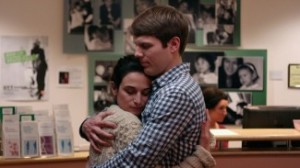“Wait till you see my merkin.”
It’s sad, the state of movies, how predictable they’ve become. We can say to ourselves such and such is going to happen next, and more often than not we’re right. Obvious Child subverts that notion. This is a darkly hilarious and deeply poignant film about the power of choice. You might ask, “How can a movie about abortion make me laugh?” Trust me, you will. And you’ll cringe, and if you’re human at all you’ll be overcome with emotion. This isn’t just an abortion movie. That would be criminal to reduce it to a single thing. Choice and consequence go hand in hand. The movie proves that, and shows you there is the possibility to find good from even the most guilt-ridden decisions.
Donna Stern (Jenny Slate) is a 20-something comedienne living in New York. She’s sexy in a secretive way, as if she purposely tries to cover it up with vintage sweaters and messy hair. All of her gigs are performed in the same crappy bar to a small audience and her set almost entirely revolves around her boyfriend Ryan (Paul Briganti). The crowd laughs, he doesn’t. The two talk in the single bathroom after the show. That’s where he dumps her, in the same place people actually physically do that…and you thought breaking up over the phone was bad. Ryan leaves Donna’s life and is quickly replaced by a wine and Jack Daniel’s fueled drinking bender. She loses her boyfriend, the bookstore she works at is about to close, and she bombs on stage. What else could possibly go wrong?
A night out at the same bar introduces us to Max (Jake Lacy). He is an impossibly nice and straight-laced guy. Business attire and southernly polite manners make him stick out in a sea of pretentious hipsters. They somehow hit it off, and the following scenes are some of the most authentic pieces of storytelling I’ve seen of late. Casual banter, drunken flirting, the preposterous walk home. And then they’re in his apartment. They play loud music, continue to drink, and whirl around like dervishes. Drunken sex leads to what it often does. So many movies simplify their characters and don’t let them act like real people. This doesn’t, and it makes you believe in the movie as a whole. We know it’s not true but still believe it could happen.
Always there for Donna is her maternalistic roommate Nellie (Gaby Hoffmann), along with their hysterically flamboyant friend Joey (Gabe Liedman). There’s her father Jacob (Richard Kind), an eccentric guy who makes puppets for a living. Her mother Nancy (Polly Draper), living separately from Jacob, is an established and respected business professor. The film sports a tremendous cast that embellishes the humorous moments and emphasizes the weight of the drama. Writer / director Gillian Robespierre sets out to create a unique story on a sensitive topic. And she succeeds.
Watch out for Jenny Slate. Her performance is hypnotic, heartfelt, and quirky. She’s a more mature version of Juno minus all of the forced offbeat indie dialogue and actions. You feel like you’d meet this girl if you went to a bad bar in New York to watch a comedy show. And I emphasize the use of girl, because she is not a grown woman. Her job is in limbo, she has no healthcare, she asks her parents for money. We sympathize with her. It’s easy to watch and picture yourself or a close friend in her shoes. Slate has always been funny, yet her dramatic work is far more impressive. Sure, she can crack a good joke. The surprise comes from her ability to elicit moments that make you both squirm and feel her forlorn state of mind. There’s a scene towards the end where she cries, and it is so subtle that you really have to pay attention to see the tears, but it might be the best on-screen cry of the year. Everything about it is heartbreaking. It’s one of the strongest female performances of 2014.
The last half hour of this movie is about as unpredictable a storyline as you could expect. You anticipate something to happen, for the director Robespierre to take the easy route in her directorial debut. She does the opposite. Every scene is challenging, and the balance between intense dramatic scenes interspersed with jokes and laughter are so well done. This is obviously a labor of love and I applaud her for bringing a story to the screen that doesn’t hide the ugly truth. We see women sitting in a waiting room at the abortion clinic, wearing pink gowns and looking like a cult. We hear the low whirring of the death machine that takes away an infant’s life. This movie is a brutally honest depiction of painful circumstance that is numbed by laughter.
Abortion as a story is a hard one to tackle. Obvious Child works because it leaves out all of the religious and political hoopla and shows us one woman’s decision based on who she is and where she’s at in her life. I don’t think I’ve seen a movie quite like it. The movie isn’t perfect…some of the characters are underutilized and feel like props instead of vital pieces of the story. That doesn’t make it any less sincere, especially because of Slate’s performance. The title comes from a Paul Simon song. He asks in the refrain, “Why deny the obvious child?” We learn why. Watch the movie and think about the title long and hard. It’s meaningful on multiple levels. Whether you agree with Donna’s actions or not, you can’t help but sit back in admiration at the forthright truthfulness and stern conviction in one’s own decisions. It’s a terrifically funny and tender film.
“I would like an abortion please?”
Rating: 4.5 out of 5







Pingback: A Long Way Down (2014) | Log's Line·
Pingback: Wish I Was Here (2014) | Log's Line·